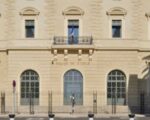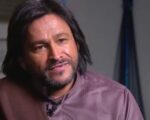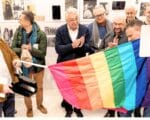>> Suras and Tolerance: Meet Europe’s Gay Imam
Il est gay, imam et français. Il a ouvert une mosquée « gay-friendly » à Paris et marié un couple lesbien en Suède… Le Spiegel est allé à sa rencontre et raconte son histoire peu commune. De nationalité algérienne, les parents de Zahed ont émigré en France quand celui-ci n’était encore qu’un jeune enfant. Lors de son premier jour de cours, son professeur lui a demandé s’il était un garçon ou une fille. C’était un garçon « svelte, fragile, affable », décrit-il au magazine.
Aujourd’hui, Zahed se souvient encore de son père qui le traitait de « tapette » ou de « petite pleureuse » quand il était petit. Puis son père est devenu silencieux. Il a cessé de le regarder ou de lui parler. Zahed s’est donc interrogé sur le sens de sa vie et son identité. À 12 ans, il est allé à la mosquée pour trouver des réponses à ses questions. Il a lu le Coran et est devenu un membre de la confrérie salafiste. Zahed a commencé a prier cinq fois par jour, puis il a décidé de devenir imam et a projeté d’étudier l’islam à La Mecque.
Pendant cette période, la confrérie des salafistes était tout pour lui. Le jeune homme s’est senti soutenu et protégé par ses frères de prières. Il s’est épanoui dans ce cadre. Il a prié avec dévotion et s’est senti touché par la grâce de Dieu. Il a fait la rencontre de Djibril, un « frère » de l’association, avec qui il a dormi front contre front. Ils se sont dit « Uhibbuk fi-Allah », ce qui veut dire « je t’aime au nom d’Allah ». Un amour « différent » de celui qu’il éprouvait pour les autres salafistes et dont il a fait part à ses frères. Mais Djibril a dit que cela n’était pas possible.
« On le savait »
Quelque temps plus tard, sa famille a déménagé à Marseille. Étudiant, il a rasé sa barbe, a arrêté de prier et a sombré dans la fête et la drogue. Il a aussi contracté le VIH. Il a appelé ses parents depuis sa chambre pour leur dire qu’il était gay. Sa mère a pleuré et son père l’a regardé pour la première fois depuis longtemps. Il lui a dit : « On le savait. » Et il a fini par accepter la différence de son fils. Zahed n’en revient toujours pas.
Par la suite, il s’est mis à étudier la psychologie et l’anthropologie et a commencé à travailler pour une association caritative. Lors d’un voyage professionnel au Pakistan, il s’est remis à se poser des questions, et a recommencé à prier dans sa chambre d’hôtel. Il s’est replongé dans le Coran puis a découvert HM2F, une association pour les gays et lesbiennes musulmans en France. Deux ans plus tard, après avoir appris dans les journaux que les imams refusaient d’enterrer un musulman transsexuel mort en France, Zahed a créé une mosquée à Paris. Il l’a conçu comme un endroit où chacun pouvait trouver un imam pour être traité avec dignité, et qui accepterait de marier ou d’enterrer une personne sans se soucier de sa sexualité. Il est tombé amoureux et a trouvé un imam qui a accepté de le marier à son compagnon.
Aujourd’hui, il a 37 ans et voyage à travers le monde pour donner sa vision d’un islam qui n’exclut pas les homosexuels. Sa vie n’est pas parfaite, son mari l’a quitté et il n’a toujours pas trouvé de réponses à toutes ses questions. Mais il avance.
Il est allé en Suède pour marier un couple lesbien. Son voyage a été financé par la marque 7-Eleven. Les médias et surtout les réseaux sociaux ont diffusé la nouvelle, photos à l’appui postée par l’Imam sur son compte Facebook, du mariage de Myriam Iranfar, qui attend son premier bébé, avec Sahr Mosleh, atteinte d’une maladie osseuse génétique.
« Il est merveilleux que ces deux épouses commencent une nouvelle famille après des années de souffrance. Il est dur de quitter le pays pour un Etat étranger, mais enfin, elles peuvent vivre ensemble ».
Mais, le mariage a beau s’être déroulé dans la lointaine et paisible Stockholm, il a suscité un communiqué virulent du Front de la Sahwa Salafiste libre, mouvement non agréé, qui mène régulièrement des campagnes sur des sujets divers sans drainer les foules, heureusement. Ils ont cependant appelé dans un communiqué « à laver l’honneur de l’Algérie de ce pervers qui se dit imam homosexuel qui marie les homosexuels » et qui vit « avec un homme comme lui dans le péché (haram) » :
Il n’existe pas d’imam homosexuel en Islam. L’homosexuel en Islam est traité par le glaive et la mort afin de laver la société de sa saleté » indique le communiqué du « Front de la Sahwa Islamique Salafiste en appelant à « purifier l’honneur algérien de cette apostat homosexuel ».
« L’Etat algérien et la société doivent retirer la nationalité algérienne à celui qui se dit imam algérien gay « Ludovic-Mohamed Zahed où appliquer les peines (houdoud) prévues par la charia contre lui ».
En 2012, il était interviewé par « Radio Libre Expression » en partenariat avec Radio Galère 88.4 FM à Marseille au sujet de son livre: Le Coran et la Chair (Editions Max Milo).
[spacer]
[spacer]
>> Born in Algeria, Zahed’s parents moved to France when he was a young child. When he went to school there for the first time, his teacher asked him if he was a boy or a girl. He was a delicate child, slender, shy and affable. Zahed recalls his father telling him he was a pansy, a crying little girl. Then his father went silent. He no longer looked at Zahed or even spoke to him.
Zahed asked himself what it was he was put on this Earth to do? Who am I? He was filled with self-doubt. Looking for answers, he went to a mosque at the age of 12.
Islam, Zahed would learn, provided answers to all questions. The Koran is a book about which there can be no doubts. Allah overcomes all resistance. As a Muslim, you are a student of Islam and your mission in life is to praise God.
Zahed read the Koran and became a member of a Salafist brotherhood. He prayed five times a day and cherished the answers he received as well as the support. Zahed decided he wanted to become an imam, a Muslim scholar, and that he wanted to study in Mecca.
Fellowship
Brotherhood among the Salafists meant everything to him. The young men prayed shoulder to shoulder and formed a bulwark that protected them all. Zahed felt fulfilled in the fellowship. He prayed with devotion and even felt there were moments when he knew what it meant to be enlightened. That’s God, he thought to himself.
One of his brothers in the fellowship was named Jibril. He had black eyes, dark skin and thick shiny hair. Zahed slept next to him, forehead against forehead. They said to each other « Uhibbuk fi-Allah, » or « I love you for the sake of Allah. »
At the age of 17, Zahed slept in a room with Jibril and lay awake at night gazing at him. He loved Jibril for the sake of Allah, but in a way that was also different from his love for the other Salafists.
He then spoke to Jibril and his other Muslim brothers about this yearning. Jibril said it couldn’t be.
A short time later, Zahed’s family moved to Marseille. He studied for his pre-university exams, shaved off his beard and ceased praying, turning instead to partying and drugs. He also had a relationship with an unfaithful man and became infected with HIV. Looking back today, he says he was lost at the time.
Coming Out
He called his parents to his room and told them that he was gay. His mother cried, his father looked at him again for the first time in a long while and said, « We knew. » His mother wouldn’t stop crying, prompting his father to say, « He’s tried to change for the past 15 years, so we have to accept him. » He then smiled at his son.
To this day, Zahed doesn’t fully understand what happened to make his father came around.
Zahed studied psychology and anthropology and began working for an aid organization. At 30, he went on a business trip to Pakistan and reflected for the first time on his life and whether he was good person or not. A short time later, while in a hotel room, he sank to his knees and began praying.
He also began reading the Koran again. He didn’t come across a single sura in it condeming homosexuality. What he did find, though, were plenty of homoerotic poems in classic Arab literature. He then founded HM2F, an association for gay and lesbian Muslims in France.
Two years ago, when the news broke that no imam would bury a Muslim transsexual who had died in France, Zahed founded a mosque in Paris. He intended it as a place where all people could find an imam who would treat them with dignity, bury or marry them and give them a sense of belonging, regardless whether they loved men or women. He also found a partner and the two were then married by an imam friend.
A Voice of Tolerance
Today, Zahed is 37 years old. He travels around the world giving lectures on homosexuality in Islam. He was in Sweden to conduct the wedding ceremony for a lesbian couple.
His trip had been funded by 7-Eleven and took place the morning after his arrival in front of a local branch of the convenience store, decked out with flowers. The sun shone, the fragrance of the flowers filled the air and Zahed smiled.
But the night before, Zahed had confided that he was worried about his own marriage, his husband having moved out just a few days prior. He says that his father told him on the phone: « Couples split up. That’s normal, my son. It has nothing to do with your homosexuality. » It was the first time Zahed’s father had used the word « homosexuality. »
Zahed’s life isn’t perfect. He’s ill, he misses his husband and he hasn’t found the answers to everything in life. Still, at least he now knows who he is. Zahed has found an approach to his family and he has found his faith. Perhaps the best moments in his life are yet to come.
During the wedding ceremony in Sweden, he gives his blessing and sings the first suras of the Koran. They end with the words: « Keep us on the right path. The path of those upon whom Thou hast bestowed favors. Not (the path) of those upon whom Thy wrath is brought down, nor of those who go astray. »
The couple begins to cry. Zahed looks at the people who have gathered and says, « You can now applaud — or do whatever you like. »
Avec lepoint.fr et Hebba Selim pour le HuffPost Algérie


















